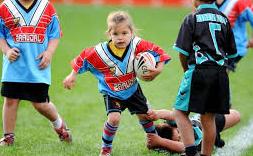Rugby is a game with its roots in England. The intensity and nature of this sport has attracted a huge fan base in the world. Countries in Africa, Europe, Asia, and America have been quick to embrace this sort. Besides, many schools have identified the need and significance of having it a part of the school’s learning curriculum. This allows children to take up the sport at an early stage in life. This can be quite rewarding considering the health and life benefits that it brings into their lives. As such, here are some health and emotional strengths that children derive from playing this sport.
Benefits
Improved Physical Fitness
Rugby is a contact or physical sport. It involves running across the pitch, making interceptions and tackling your opponents. When training or competing during games, the child slowly improves his/her fitness levels. Besides, these exercises help build the muscular strength and the stamina of the player.
Improves Morals
As much as the game looks physical, it is governed by a clear set of rules. These rules serve to ensures the player behaves ethical and professional o and of the pitch. If he/she fails to play by the rules, then appropriate corrective measures are imposed on them. As such, a child develops his moral side by abiding by the rules of the game. Good ethical and moral senses are invaluable life skills that can be employed in different spheres of life.
Trains a child to work with others
Rugby, being a team sport, teaches the child to play for the team from a very tender age. As much as one has brilliant individual skills, the team result is what matters in rugby. With this in mind, the child always strives to give his best and inspire the best in his/her teammates. A positive team spirit is not only good for playing but also an invaluable asset in our daily lives.
Sharpens Assessment and Concentration Skills
Rugby is a sp ort that demands clear evaluation of circumstances surrounding the game. For instance, the player is expected to make calculated tackles, read the opponents passing lines when intercepts and device ways of beating the opponents when on the ball. Playing this game sharpens the child’s wits thus making it easy to excel in academics.
ort that demands clear evaluation of circumstances surrounding the game. For instance, the player is expected to make calculated tackles, read the opponents passing lines when intercepts and device ways of beating the opponents when on the ball. Playing this game sharpens the child’s wits thus making it easy to excel in academics.
Boots Self Esteem
When a child is academically weak, a sport like rugby can be a superior exit route. Notably, most children that find academics difficult develop negative self-esteem and self-pity. This self-defeating attitude can be countered by excelling in the game thus boosting their self-esteem.

